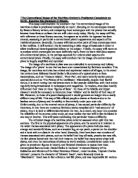Two literary works that thoroughly examine the effects of colonization are Blood Brothers by Pham Van Ky and The Sea Wall by Marguerite Duras.
Mallie Strickland
March 4, 2011
French Lit.
Colonization in Blood Brothers and the Sea Wall
The French had occupied Indochina, present day Vietnam, for about one hundred years in 1945. The imposing French had economic interests but disguised these interests as moral duties to humanity to civilize those who were not as civilized as they were. However, colonization had dramatic effects on both the colonized and the colonizers. Two literary works that thoroughly examine the effects of colonization are Blood Brothers by Pham Van Ky and The Sea Wall by Marguerite Duras. Through literary comparison we can discern the effects of the colonized in Blood Brothers and the effects of the colonizers in The Sea Wall.
The narrator’s Western influence in Blood Brothers is significant because it reveals the long term effects of colonization. The narrator states, “One thing was clear: he and I no longer had anything in common. I refused to blame this on the conflict between East and West” (Ky 5). He refers to the narrator’s friend, Le Tam. Le Tam represents the Eastern view of the world, with Taoist devotion to no action, simplicity, and understanding being one with nature. The narrator however, did not turn from the West. In fact, he embraced Western culture, “…the West obsessed me…Joyfully I immersed myself in it” (29). Here we have two colonizers who have been influenced differently by the West, one turns away from the culture and the other embraces it. The effects of these opposing reactions is evident when two lifelong friends no longer have anything in common – a rift occurs separating the two, hence the struggle between the East and West.







